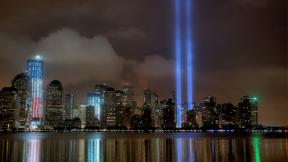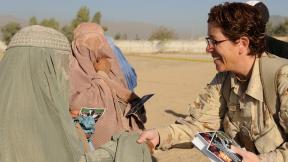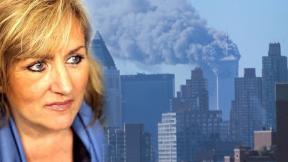
For many Americans who lived through 9/11, life has been clearly divided into two: life before the attacks five years ago and life after. The effects of 9/11 politically, socially, economically and in virtually all spheres of life are clearly reflected by facts and statistics like the following:
Loss of American Lives on 9/11 and after
The number of dead and wounded from the actual attack is officially, as of September 2002, 2,819. Of this figure, 343 were firefighters and paramedics. For the firefighters who survived, four months after 9/11, 300 were on leave for respiratory problems. It is very likely that other New Yorkers experienced similar problems, since the fires from the attack continued to burn for 99 days. http://www.newyorkmetro.com/news/articles/wtc/1year/numbers.htm
An estimated 3,051 children lost a parent to the 9/11 attacks.
2,999 soldiers have been killed in Iraq and Afghanistan while and an estimated 48100 have been injured. http://www.antiwar.com/casualties/
Separation from loved ones
The subsequent War on Terror has led to 200,000 American families separating from at least one family member, usually a spouse or parent, in Iraq.
Mental Health
The 9/11 attacks led to an increase in mental health problems. In New York alone, the estimated number of New Yorkers suffering from post-traumatic-stress disorder as a result of 9/11 is 422,000
Economic Impact
Capitalism requires free travel and flow of capital. Even after five years, Americans don?t feel free to travel and London is replacing New York as the financial capital for a good part of the world.
The total economic impact on New York City of the World Trade Center attacks ranges between $82.8 and $94.8 billion. http://fl1.findlaw.com/news.findlaw.com/hdocs/docs/terrorism/911nycimpactrpt.pdf#search=%22impact%20of%209%2F11%22 The total impact to the whole country may be far higher.
Defense Budget Eating Up Social Programs
9/11 led to the largest increase in the United States' Defense budget since the administration of the late President Ronald Reagan in the 1980s. Spending in this area was raised by 26 percent. http://www.whitehouse.gov/omb/budget/fy2005/defense.html
These figures typically do not include combat figures, so 2001 onwards, the Afghan war, and 2003 onwards, the Iraq war costs are not in this budget. As of early 2006, Congress had already approved an additional funding total of $300 billion for operations in Iraq and Afghanistan.
http://www.globalissues.org/Geopolitics/ArmsTrade/Spending.asp#USMilitarySpending
The attacks have negatively affected education and social services. Funds that could have been used for these extremely critical departments have been diverted to support the War on Terror. Look at an interesting comparison of what is happing http://www.truemajorityaction.org/oreos/
Loss of Favorable World Opinion
America's global image continues to slip and support for the war on terrorism has declined even among close US allies like Japan. The war in Iraq is a continuing drag on opinions of the United States, not only in predominantly Muslim countries but in Europe and Asia as well. A Pew Global Attitudes survey shows that the Iraq war continues to exact a toll on America's overall image and on support for the struggle against terrorism. Majorities in 10 of 14 foreign countries surveyed say that the war in Iraq has made the world a more dangerous place. In Great Britain, America's most important ally in Iraq, 60 percent say the war has made the world more dangerous, while just half that number (30 percent) feel it has made the world safer. http://pewglobal.org/reports/display.php?ReportID=252
Negative impact on civil rights
From the US government wiretapping telephone calls of American citizens without a warrant to no-fly lists, Americans of all shades and stripes have witnessed the erosion of civil rights in virtually all aspects of life. Read more about the Top Ten Abuses of Power Since 9/11 at http://www.aclu.org/safefree/general/26684res20060906.html
Closing of the American mind
Scholars and intellectuals from the world now avoid coming to the US.
As the United States restricts immigration, including that of top notch scholars and students from abroad, our exposure to citizens from other parts of the world will have only negative effects in the long run. In a highly globalized world, this has not only cultural and political repercussions, but economic ones as well. As the world's leading nation, by cutting ourselves off from others, we are breeding a dangerous isolation that will only lead to our downfall.
Loss of World Talent
Brain drain from the world was to the America's benefit. In terms of immigration on a broader level, Americans have become hardened towards foreigners and the government has begun taking strict measures against all immigrants. It started with those from Muslim countries (remember the NSEERS program, better known as special registration for all immigrant men from Muslim nations?) to the current debate over undocumented immigrants.
Polarized America
Politically, the country has become more polarized than ever, especially between Americans who support the war on Iraq and those who don't. Churches across the country have found difficulty in communicating across on these lines.
The War on Terror must not limit the freedoms and liberties for America.
Photo Attribution: http://commons.wikimedia.org/wiki/File:September_11th_attack_being_remembered_in_New_York.jpg








Comments
Is there a cite button
Is there a cite button anywhere?
I need help on my 911 project
I need help on my 911 project
Homework
This helped me so much with my homework on 9/11
Location
more
i need more info
Location
War for peace
What about the families of the soldiers who lost their life or suffering from mental n physical health problems because of fighting in Iraq or Afghanistan.... Y don't we start fighting for peace
Location
Add new comment